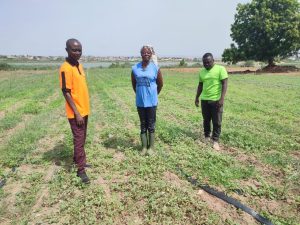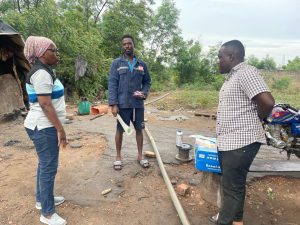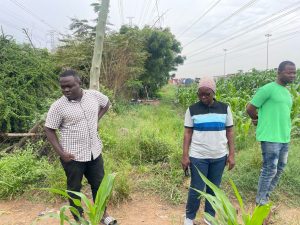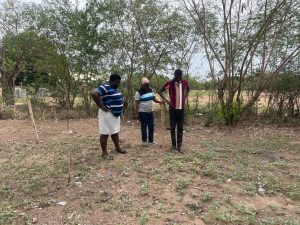In fulfilment of its core mandate, the Department of Agriculture continues to conduct regular monitoring and supervision across all operational zones. These activities provide important technical backstopping and support to Agricultural Extension Agents (AEAs), ensuring that field operations stay on track and meet set targets. Monitoring visits also offer a platform for direct engagement with traditional authorities, opinion leaders, assembly members, and key actors along the agricultural value chain to discuss emerging policies, challenges, and collaborative solutions.
2.0 OBJECTIVES
The main objectives of the monitoring and supervision exercise were to:
- Provide immediate technical support and guidance to Agricultural Extension Agents (AEAs) and other field officers in addressing operational challenges.
- Observe and assess the quality and relevance of extension services delivered to farmers and households.
- Engage directly with farmers, FBOs, chiefs, and community stakeholders to gather feedback and recommendations.
- Monitor the distribution and correct use of subsidized agricultural inputs such as seeds, fertilizers, and agrochemicals.
- Promote the adoption of modern, climate smart, and good agronomic practices demonstrated by the Agricultural Extension Agents (AEAs).
- Verify the accuracy and completeness of field data, including digital farmer registrations, yield estimates, and farm records.
- Identify bottlenecks such as input shortages or logistical gaps and propose practical solutions for prompt redress.
- Strengthen coordination among Agricultural Extension Agents (AEAs), supervisors, farmer groups, input dealers, and market actors.
- Ensure compliance with safety, biosecurity, and environmental standards, especially regarding pesticide use and livestock waste management.
3.0 ACTIVITIES
During the first quarter, the Municipal Agricultural Officers (MAOs)carried out field visits to the KAMSBERG, ZEKAS, ONSBAC, and KPONE zones to oversee and support the smooth implementation of government agricultural programmes.
Key activities undertaken by the DDO included:
3.1 Field Inspections and Spot Checks
- Visited various crop farms including vegetable, grain, and starchy crop fields to assess farm conditions and confirm that recommended agronomic practices were being followed.
- Checked input usage to ensure proper seed quality, fertilizer application, and correct agrochemical handling.
- 3. 2 Engagement with Farmers and FBOs
- Met with individual farmers, FBOs, and cooperative groups to discuss input distribution, mechanization access, and extension service delivery.
- Encouraged farmers to complete their digital registration on the Feed Ghana Portal.
3️.3 Technical Backstopping for Agricultural Extension Agents (AEAs)
- Offered practical on the spot technical support to Agricultural Extension Agents (AEAs) to resolve field challenges.
- Observed demonstrations of climate smart techniques, pest scouting, and household backyard gardening.
3.4 Monitoring of Special Projects
- Supervised community sensitization sessions on the government’s flagship Feed Ghana Programme.
- Visited mushroom production sites, fish ponds, and small ruminant farms to inspect animal health and promote good biosecurity practices.
3.5 Community and Stakeholder Engagement
- Engaged traditional leaders, assembly members, and other stakeholders to raise awareness of the Feed Ghana objectives.
- Discussed strategies for improving market linkages and promoting FBOs/Cooperative formation for better collective marketing.
- Collected up-to-date field data on farm sizes, beneficiaries, and key challenges identified by farmers and Agricultural Extension Agents (AEAs).
4.0 KEY FINDINGS
- The high cost of agricultural inputs remains a major concern.
- Some farmers still misuse agrochemicals despite ongoing education.
- Adoption of certified seeds is still relatively low in some communities.
- Poor disposal practices for poultry waste persist.
- Farmers show growing interest in digital registration and smart agricultural technologies.
5.0 CHALLENGES
- Inadequate of a feed testing facility for poultry farmers within the Municipality.
- Rising costs of feed ingredients and other critical farm inputs.
- Unpredictable weather patterns that disrupt production schedules.
- Inadequate access to fully equipped Agricultural Mechanization Centres.
6.0 RECOMMENDATIONS
To address these challenges, the Department recommends the timely provision of resources and improved logistical support to strengthen monitoring and field backstopping. There is a strong need to intensify community sensitization to ensure full participation in new initiatives and to fast-track digital registration of all farmers onto the Ministry of Food and Agriculture’s webbase portal.
7.0 CONCLUSION
Ongoing field monitoring and backstopping of activities of Agricultural Extension Agents (AEAs) across all zones continue to reinforce the Department’s capacity to track progress, provide realtime support to Agricultural Extension Agents (AEAs) and all value chain actors, and ensure effective implementation of national agricultural policies. The new initiatives introduced in 2025 are already contributing to better extension service delivery and increased farmer productivity within the Municipal
REPORT IN PICTURES




